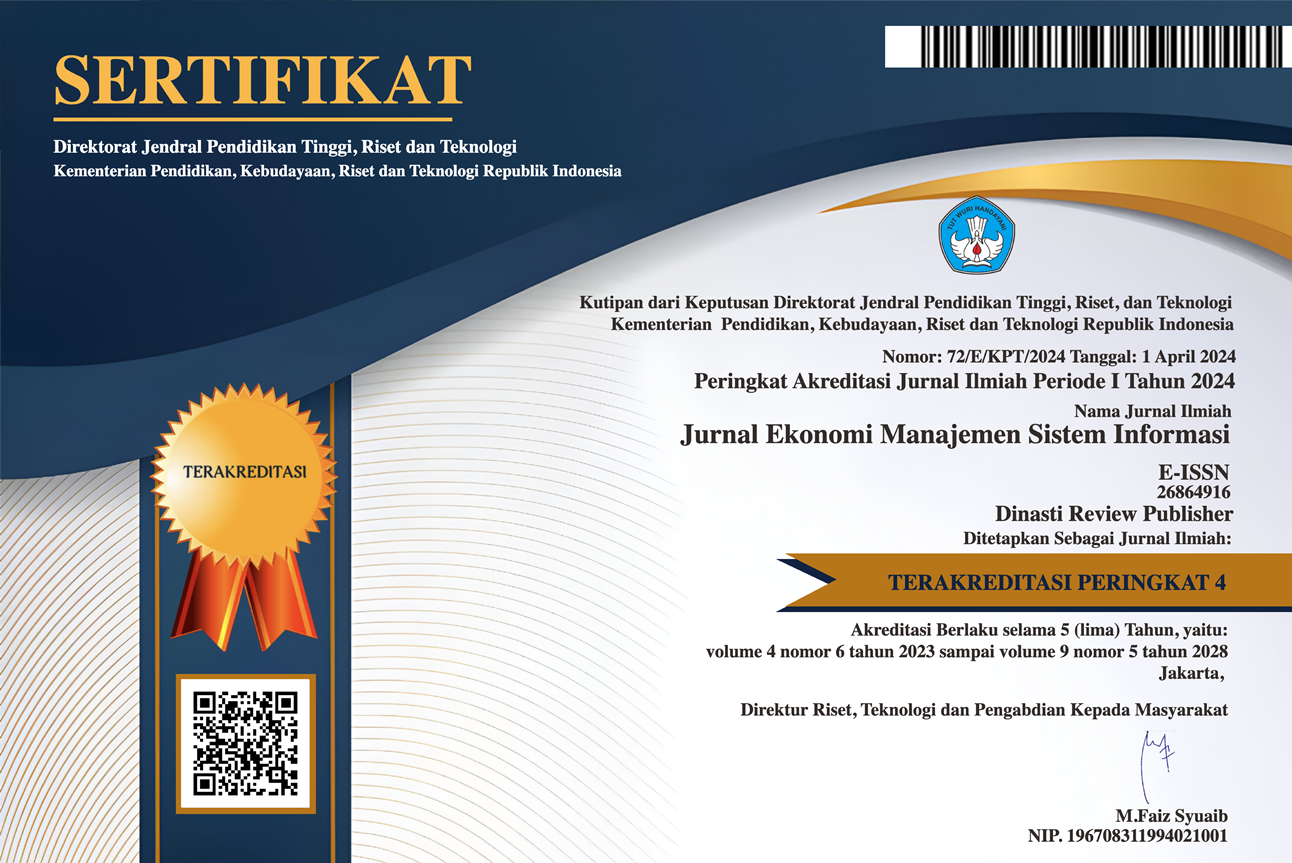Digital Customer Relationship Management in Improving Service Quality Through E-Commerce Systems
DOI:
https://doi.org/10.38035/jemsi.v6i3.4074Keywords:
Digital Customer Relationship Management (d-CRM), E-Commerce, Service Quality, Customer Loyality, Automation, PersonalizationAbstract
Digital Customer Relationship Management (d-CRM) is an evolution of traditional CRM that focuses on the use of digital technology to manage customer relationships. In the context of e-commerce, “d-CRM” is a very important role in improving service quality through personalization, automation, and deeper utilization data of customers. This paper aims to explore how “d-CRM” can be applied in e-commerce platforms to improve service quality, customer satisfaction, and loyalty. By reviewing a case study on CV Bintang Raya Plastik and the literature, this article highlights the benefits of “d-CRM” and the challenges it in implementation.
References
Abdiansyah, T. (2021). Inovasi Transaksi Ekonomi Berbasis Digital di Pasar Tradisional Probolinggo. Jurnal Sosial Politik Integratif, 1(3), 1-9.
Adithya, A. R. (2021). Sistem Informasi E-CRM Berbasis Web Untuk Peningkatan Loyalitas Serta Pelayanan. Jurnal Portal Data, 1(2).
Babenko, V. K. (2019). Factors of the development of international e-commerce under the conditions of globalization. SHS Web of Conferences, 65, p. 04016.
Cahyono, G. H. (2018). Kewirausahaan dan Inovasi dalam E-Commerce. Swara Patra, 8(1), 80-92.
Chen, Y. &. (2021). Investigation of finance industry on risk awareness model and digital economic growth. Annals of Operations Research, 1-22.
Choudhury, M. M. (2014). CRM to social CRM: the integration of new technologies into customer relationship management. Journal of Strategic Marketing, 2, 149–176.
Courchesne, A. R. (2019). Using Technology to Optimize Customer Relationship Management: The Case of Cirque du Soleil. International Journal of Arts Management, 21(2).
Endrawati, D. &. (2018). Hubungan Kualitas Layanan dengan Kepuasan Pelanggan PT. Indoguna Utama Semarang. Majalah Ilmiah Inspiratif, 3, 6.
Haryanto, H. &. (2018). Model Manajemen Hubungan Pelanggan dan Sistem Bisnis Intelijen untuk Katalog Secara Online. Prosiding Seminar Nasional Rekayasa Teknologi Informasi SNARTISI, 1.
Kethineni, S. C. (2018). Use of bitcoin in darknet markets: Examining facilitative factors on bitcoin-related crimes. American Journal of Criminal Justice, 43(2), 141-157.
Komalasari, D. P. (2021). Buku Ajar Digital Marketing. Umsida Press.
Kumar, V. a. (2018). Customer Relationship Management. Berlin: Springer.
Lam, C. &. (2019). Readiness of upscale and luxury-branded hotels for digital transformation. International Journal of Hospitality Management, 79, 60-69.
Ledro, C. N. (2022). Artificial intelligence in customer relationship management: literature review and future research directions. Journal of Business & Industrial Marketing, 37(13), 48-63.
Muhtadi, A. S. (2018). Strategi Indosat Mempertahankan Pelanggan melalui Customer Relationship Management. Reputation: Jurnal Hubungan Masyarakat, 1(2), 70-88.
Olomu, M. O. (2019). Marketing automation innovation practices and customer retention performance: evidence from the Nigerian manufacturing SMEs. International Journal of Business Performance Management, 20(3), 212-228.
Pressman, R. S. (2010). Rekayasa Perangkat Lunak Pendekatan Praktis. Yogyakarta: Andi.
Reinartz, W. K. (2004). The Customer Relationship Management Process: Its Measurement and Impact on Performance. Journal of Marketing Research, 41(3), 293–305.
Trainor, K. J. (2012). Relating Social Media Technologies to Performance: A Capabilities-Based Perspective. Journal of Personal Selling & Sales Management, 32(3), 317–331.
Zaelani, I. R. (2019). Peningkatan Daya Saing UMKM Indonesia: Tantangan dan Peluang Pengembangan Iptek. Jurnal Transborders, 3(1), 15.
Downloads
Published
How to Cite
Issue
Section
License
Copyright (c) 2025 Kasino Martowinangun, Johni S Pasaribu, Jusuf Nurdin

This work is licensed under a Creative Commons Attribution 4.0 International License.
Hak cipta :
Penulis yang mempublikasikan manuskripnya di jurnal ini menyetujui ketentuan berikut:
- Hak cipta pada setiap artikel adalah milik penulis.
- Penulis mengakui bahwa Jurnal Ekonomi Manajemen Sistem Informasi (JEMSI) berhak menjadi yang pertama menerbitkan dengan lisensi Creative Commons Attribution 4.0 International (Attribution 4.0 International CC BY 4.0) .
- Penulis dapat mengirimkan artikel secara terpisah, mengatur distribusi non-eksklusif manuskrip yang telah diterbitkan dalam jurnal ini ke versi lain (misalnya, dikirim ke repositori institusi penulis, publikasi ke dalam buku, dll.), dengan mengakui bahwa manuskrip telah diterbitkan pertama kali di Jurnal Ekonomi Manajemen Sistem Informasi (JEMSI).










































































